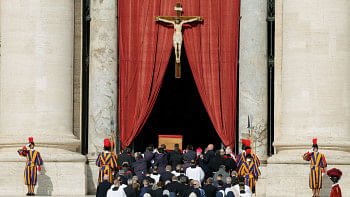Hutton inquiry begins cross-examination
Britain's inquiry into the death of weapons expert David Kelly begins cross-examination yesterday as it digs deeper into the case the government made for war against Iraq and the possible motives for Kelly's suicide.
So far, witnesses including Prime Minister Tony Blair and Defence Secretary Geoff Hoon have only been quizzed by lawyers for the inquiry itself. From now on, with counsel for the government, Kelly's family and the BBC involved, the questioning will become much tougher.
Blair is not re-appearing at the Hutton inquiry but Hoon, widely expected to become the first ministerial casualty of the Kelly affair, has been summoned for next Monday.
Scientist Kelly killed himself after being singled out as the source of a BBC report that claimed the government had "sexed up" evidence of Iraq's weapons of mass destruction to justify the conflict to a sceptical public.
The inquiry, chaired by Lord Hutton, has plunged Blair into the worst crisis of his six-year tenure and raised serious questions over a dossier on Iraq's weapons that helped make the case for war.
Martin Howard, deputy chief of defence intelligence, is one of the witnesses to be cross-examined yesterday.
During the drafting of the Iraq dossier, at least two intelligence officers told Howard they were unhappy with how it was presenting evidence of Iraq's weapons.
Howard is also likely to be quizzed about his involvement in the government's strategy to name Kelly as the source of the BBC's report.
Kelly's wife Janice told the inquiry her husband felt betrayed by the ministry after he was singled out as the source of the BBC report. He died from a slit wrist soon after his name was made public.
A Thames Valley Police officer, a pathologist and a second Ministry of Defence official, Kate Wilson, will also testify on Tuesday.
Evidence given to the Hutton inquiry has particularly raised doubts about a claim in Blair's dossier on Iraq's armament that banned weapons could be fired within 45 minutes.
Britain's secretive intelligence chief, MI6 head Sir Richard Dearlove, conceded on Monday that criticism of the dossier was valid because the 45-minute assertion was "misinterpreted."
Breaking with precedent, Dearlove testified via audio-link to the inquiry. He said he stood by the intelligence in the September 2002 dossier but added the statement that Iraq could deploy chemical or biological weapons at 45 minutes' notice was only meant to refer to short-range arms.

 For all latest news, follow The Daily Star's Google News channel.
For all latest news, follow The Daily Star's Google News channel. 



Comments